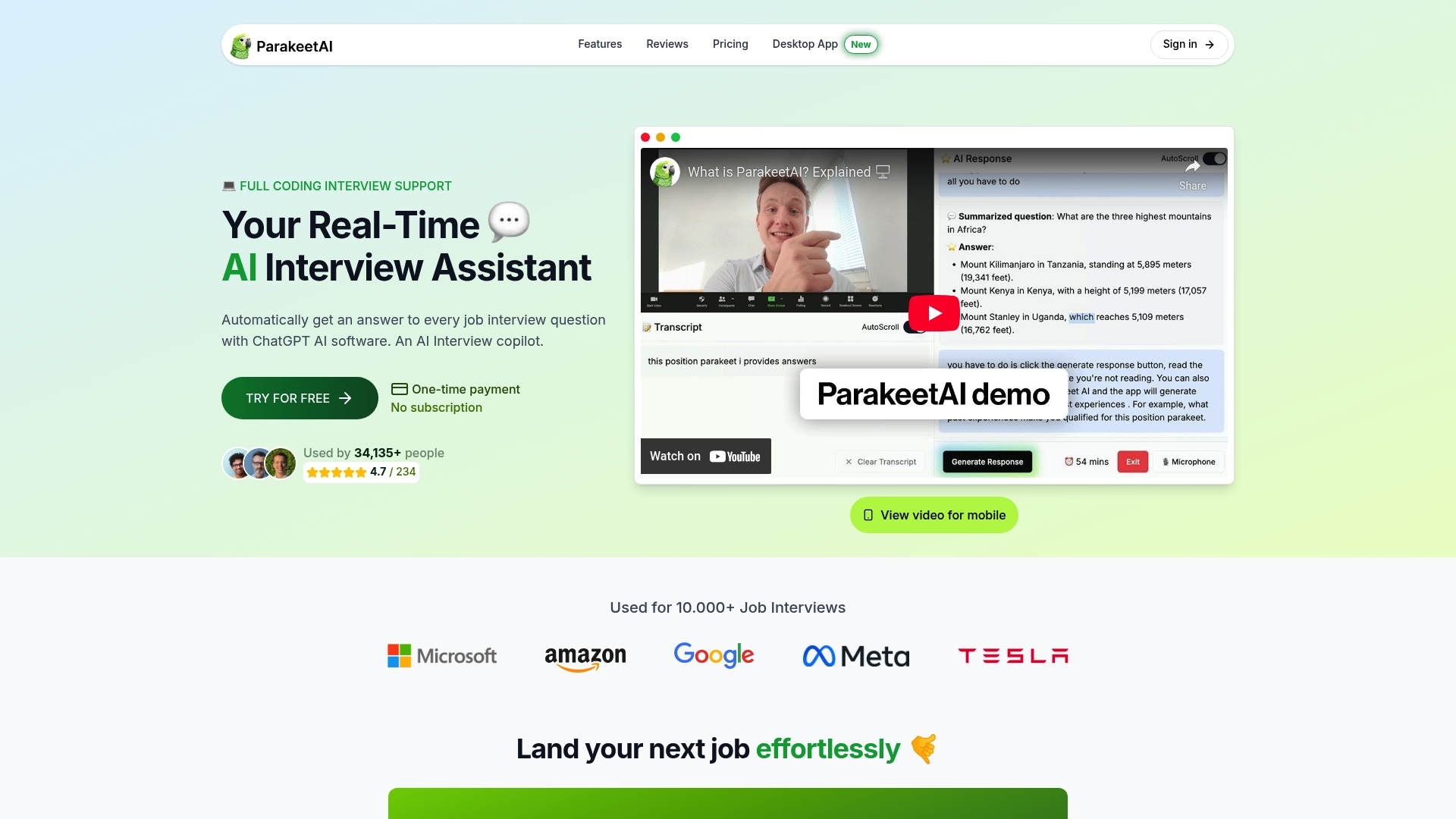Understanding the Role of AI Assistants in Interviews

AI assistants are showing up in interviews everywhere and they are not just offering practice questions. Over 66 percent of Americans still feel skeptical about AI making hiring decisions, which makes these tools seem risky at first. But instead of just changing how interviews work, they are secretly leveling the playing field for anyone who wants to land a job—no matter their background.
Table of Contents
- What Are AI Assistants And Their Purpose In Interviews?
- Why The Role Of AI Assistants In Interviews Matters
- How AI Assistants Enhance The Interview Experience
- Key Concepts Behind AI Technology In Interview Settings
- Real-World Applications Of AI Assistants In The Interview Process
Quick Summary
| Takeaway | Explanation |
|---|---|
| AI assistants enhance interview preparation. | These tools provide personalized feedback and analysis to improve candidates’ interview skills effectively. |
| They offer real-time performance insights. | AI assistants evaluate communication patterns and offer immediate feedback to help candidates improve on the spot. |
| AI democratizes interview coaching. | By providing affordable training tools, these systems level the playing field for candidates without extensive networks. |
| Traditional methods are less effective. | Relying on subjective feedback can hinder candidate preparation; AI provides objective, data-driven assessments instead. |
| Increased confidence leads to better performance. | Candidates who practice with AI tools can reduce anxiety and approach interviews with greater self-assurance. |
What Are AI Assistants and Their Purpose in Interviews?
AI assistants represent a groundbreaking technological innovation transforming how job candidates prepare for and navigate interviews. These intelligent digital tools leverage advanced machine learning algorithms to provide real-time guidance, feedback, and support throughout the interview process.
Understanding AI Interview Assistants
An AI interview assistant is a sophisticated software solution designed to help job seekers improve their interview performance through intelligent analysis and personalized recommendations. Unlike traditional preparation methods, these tools can simulate interview scenarios, evaluate communication skills, and provide nuanced feedback that helps candidates refine their approach.
Key capabilities of AI interview assistants include:
- Analyzing verbal communication patterns
- Providing instant response suggestions
- Evaluating non-verbal communication cues
- Generating personalized interview preparation strategies
The Role of AI in Interview Preparation
According to research from Virginia Tech, AI algorithms can assess verbal, paraverbal, and nonverbal communication elements to help candidates understand their interview performance. These tools go beyond simple practice sessions by offering data-driven insights into how candidates present themselves.
AI interview assistants work by processing multiple layers of communication. They can detect speech patterns, tone variations, confidence levels, and potential areas of improvement. This comprehensive analysis helps candidates identify blind spots in their interview technique that might not be apparent through traditional self-assessment or feedback from friends and family.
For job seekers, AI assistants serve as an advanced training platform that provides objective, instantaneous feedback. By simulating real interview environments and offering tailored guidance, these tools empower candidates to develop stronger communication skills, boost confidence, and ultimately improve their chances of interview success.
To clarify how AI assistants enhance interview preparation compared to traditional methods, the following table compares their core features and benefits.
| Aspect | Traditional Interview Prep | AI Interview Assistants |
|---|---|---|
| Feedback Quality | Often subjective, delayed | Immediate, objective, data-driven |
| Personalization | Generic or limited | Highly personalized, adapts in real-time |
| Practice Opportunities | Dependent on available network | Unlimited, on-demand simulated scenarios |
| Performance Evaluation | Based on personal opinions | Standardized and unbiased assessments |
| Accessibility | Can be expensive or require connections | Affordable, democratizes access |
| Reduction of Anxiety | Limited support, may feel intimidating | Structured, supportive environment |
Why the Role of AI Assistants in Interviews Matters
The integration of AI assistants in the interview process represents a pivotal shift in how job seekers prepare and employers evaluate candidates. As technological advancements continue to reshape professional interactions, understanding the significance of these intelligent tools becomes increasingly critical.
Transforming Interview Preparation Dynamics
Traditional interview preparation often relied on subjective feedback and limited practice opportunities. AI assistants fundamentally change this landscape by providing data-driven insights and personalized guidance. These tools enable candidates to receive objective assessments of their communication skills, helping them identify and address potential weaknesses before crucial job interviews.

Key benefits of AI interview assistants include:
- Standardized performance evaluation
- Immediate, unbiased feedback
- Comprehensive skill development
- Reduced interview anxiety
Addressing Modern Recruitment Challenges
According to Pew Research Center, while 66% of Americans express skepticism about AI in hiring processes, these tools offer significant advantages for both candidates and employers. AI assistants help mitigate traditional recruitment barriers by providing a more objective, consistent approach to candidate assessment.
Moreover, these intelligent systems can level the playing field for job seekers who might lack extensive professional networks or interview experience. By offering sophisticated practice environments and real-time feedback, AI assistants democratize interview preparation, giving every candidate an opportunity to showcase their true potential.
The role of AI assistants extends beyond simple practice sessions. They represent a transformative approach to professional development, empowering individuals to build confidence, refine communication skills, and approach interviews with greater strategic insight. As the job market becomes increasingly competitive, these technological tools are no longer a luxury but a strategic necessity for ambitious professionals seeking to distinguish themselves in a crowded landscape.
How AI Assistants Enhance the Interview Experience
AI assistants are revolutionizing the interview experience by introducing unprecedented levels of precision, personalization, and performance optimization. These intelligent tools transform what was once a traditionally unpredictable process into a strategic, data-driven interaction that benefits both candidates and employers.
Personalizing Interview Preparation
AI assistants create customized learning environments that adapt to individual communication styles and professional backgrounds. By analyzing a candidate’s unique strengths and potential areas of improvement, these tools generate targeted practice scenarios that simulate real-world interview challenges.
Key personalization features include:
- Adaptive question generation
- Customized feedback mechanisms
- Skill-specific coaching modules
- Performance tracking and progress visualization
Creating Objective Performance Insights
According to research from the Academy of Management Proceedings, AI-driven interview tools introduce a new dimension of procedural fairness by providing consistent, unbiased performance evaluations. These systems can detect nuanced communication patterns that human evaluators might overlook, offering candidates comprehensive insights into their interview techniques.
By processing multiple communication layers simultaneously—including verbal content, tone, speech patterns, and non-verbal cues—AI assistants provide a holistic assessment of interview performance. This multifaceted approach helps candidates understand not just what they say, but how they say it, enabling more meaningful self-improvement.
The transformative potential of AI assistants extends beyond individual preparation. They represent a paradigm shift in professional development, democratizing access to high-quality interview coaching and leveling the playing field for job seekers across different backgrounds and experience levels. As interview technologies continue to evolve, these intelligent tools will become increasingly sophisticated, offering even more nuanced and personalized guidance for professionals navigating complex career landscapes.
Key Concepts Behind AI Technology in Interview Settings
AI technology in interview settings represents a complex integration of advanced computational techniques designed to transform traditional recruitment processes. By leveraging sophisticated algorithms and machine learning models, these intelligent systems create unprecedented opportunities for more nuanced, objective candidate evaluations.
Fundamental Technological Architecture
At the core of AI interview technologies are machine learning algorithms that process and analyze multiple dimensions of human communication. These systems go beyond simple data processing, employing complex neural networks capable of understanding contextual, verbal, and non-verbal communication signals.
Key technological components include:
This table summarizes key technological components underlying AI assistants used in interview settings, highlighting how each contributes to the overall interview experience.
| Component | Purpose in Interview AI Settings |
|---|---|
| Natural Language Processing | Understands and evaluates verbal responses |
| Machine Learning Models | Adapts feedback and improves over time |
| Speech Recognition Algorithms | Analyzes tone, clarity, and speech patterns |
| Real-Time Pattern Analysis | Detects communication strengths and weaknesses |
| Predictive Behavioral Modeling | Anticipates likely responses and improvement areas |
- Natural language processing
- Machine learning models
- Speech recognition algorithms
- Real-time pattern analysis
- Predictive behavioral modeling
Intelligent Interaction Mechanisms
According to research introducing the ‘Interview AI-ssistant’, AI technologies in interview settings are evolving to create collaborative environments between human participants and intelligent systems. These advanced platforms can dynamically adapt interview scenarios, generate contextually relevant questions, and provide real-time insights into candidate performance.
The technological infrastructure enables AI systems to simultaneously process multiple communication channels. By analyzing speech patterns, tone variations, response structures, and non-verbal cues, these intelligent tools can generate comprehensive assessments that extend far beyond traditional evaluation methods.
Understanding these technological foundations reveals how AI is not just a supplementary tool but a transformative force in interview processes. As machine learning algorithms become increasingly sophisticated, they promise to introduce unprecedented levels of objectivity, efficiency, and depth to candidate assessments, fundamentally reshaping how organizations identify and select top talent.
Real-World Applications of AI Assistants in the Interview Process
AI assistants have transitioned from theoretical concepts to practical tools that are actively transforming interview preparation and execution across multiple professional domains. These intelligent systems are now being deployed in diverse scenarios, providing tangible benefits for job seekers, recruiters, and educational institutions.
Practice and Skill Development
Professional training platforms are increasingly integrating AI assistants to simulate realistic interview environments. These advanced tools offer candidates opportunities to refine their communication skills through immersive, personalized practice sessions that adapt to individual learning needs.
Key application areas include:
- Academic career counseling
- Corporate training programs
- Technical skill assessment
- Management interview preparation
- Performance review simulations
Interactive Interview Scenarios
According to research from Carnegie Mellon University, AI-powered tools now enable prospective professionals to practice complex interpersonal interactions with highly responsive digital agents. These simulations are designed to mimic real-world communication challenges, helping users develop nuanced professional communication strategies.
The AI assistants create dynamic interview scenarios that can adapt in real-time, presenting candidates with contextually relevant questions and challenges. By analyzing responses across verbal and non-verbal dimensions, these systems provide immediate, constructive feedback that helps individuals identify and improve potential weaknesses in their interview techniques.
Moreover, these AI-driven platforms democratize interview preparation by offering sophisticated coaching tools accessible to professionals across different experience levels and backgrounds. As technology continues to evolve, AI assistants promise to become even more sophisticated, offering increasingly personalized and intelligent support throughout the professional development journey.

Ready to Experience Interview Confidence with Real-Time AI Assistance?
If you have ever worried about your answers during an interview or felt unsure how you came across, you are not alone. As discussed in this article, traditional preparation leaves gaps. Feedback is often delayed or subjective, and it is hard to know exactly what you need to improve. AI interview assistants solve these problems by offering objective feedback, personalized guidance, and instant support as you speak. Parakeet AI is your next step toward real confidence in every interview situation.

Why hesitate when you could have an AI assistant by your side right now? Visit our homepage to discover how our real-time AI job interview assistant can listen to your interviews and automatically deliver answers tailored to every question. Accept the challenge and make your next interview your best one yet. Click learn more and take control of your career success today.
Frequently Asked Questions
What are AI interview assistants and how do they work?
AI interview assistants are advanced software tools designed to help job seekers improve their interview performance. They simulate interview scenarios, analyze communication skills, and provide tailored feedback based on real-time evaluations of verbal and non-verbal responses.
How can AI assistants help reduce interview anxiety?
AI assistants provide candidates with structured practice environments, allowing them to familiarize themselves with the interview process. By generating personalized feedback and offering a safe space to practice, candidates can build confidence and decrease anxiety before real interviews.
What are the main benefits of using AI assistants for interview preparation?
The main benefits include standardized performance evaluation, immediate and unbiased feedback, comprehensive skill development, and the ability to practice in a tailored environment that addresses individual weaknesses and strengths.
How do AI assistants analyze communication performance?
AI assistants analyze various communication aspects, including verbal patterns, tone variations, and non-verbal cues. They evaluate how candidates express their answers, allowing for a holistic understanding of their interview techniques and providing actionable insights for improvement.




